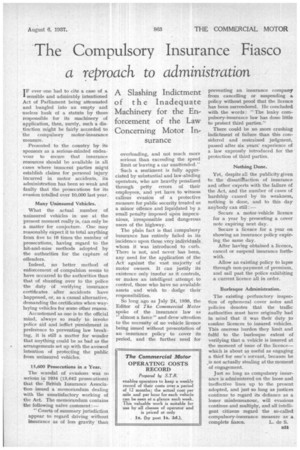The Compulsory Insurance Fiasco
Page 37

If you've noticed an error in this article please click here to report it so we can fix it.
a reproach to administration
A Slashing Indictment of the Inadequate Machinery for the Enforcement of the Law Concerning Motor In surance
IF ever one had to cite a case of a sensible and admirably intentioned Act of Parliament being attenuated and bungled into an empty and useless husk of a statute by those responsible for its machinery of application, then, surely, such a distinction might be fairly accorded to the compulsory motor-insurance measure.
Presented to the country by its sponsors as a serious-minded endeavour to secure that insurance resources should be available in all cases where innocent parties migilt establish claims for personal injury incurred in motor accidents, its administration has been so weak and faulty that the prosecutions for its evasion totalled over 10,000 last year.
Many Uninsured Vehicles.
What the actual number of uninsured vehicles in use at the present moment really is, can only be a matter for conjecture. One may reasonably expect it to total anything from five to 10 times the number of prosecutions, having regard to the hit-and-miss methods adopted by the authorities for the capture of offenders.
Indeed, no better method of enforcement of compulsion seems to have occurred to the authorities than that of shunting over to the police the duty of verifying insurance certificates after accidents have happened, or, as a casual alternative, demanding the certificates when waylaying vehicles for some other reason.
Accustomed as one is to the official mind, always so ready to invoke police aid and inflict punishment in preference to preventing law breaking, it is still a matter for wonder that anything could be as bad as the arrangements set up with the avowed intention of protecting the public from uninsured vehicles.
13,600 Prosecutions in a Year. The scandal of evasions was so serious in 1934 (13,642 prosecutions) that the British Insurance Association issued a memorandum dealing with the unsatisfactory working of the Act. The memorandum contains the following naïve comment!— "Courts of summary jurisdiction appear to regard driving without insurance as of less gravity than
overloading, and not much more serious than exceeding the speed limit or leaving a car unattended."
Such a sentiment is fully appreciated by substantial and law-abiding operators, who are heavily penalized through petty errors of their employees, and yet have to witness callous evasion of a protective measure for public security treated as a minor offence and liquidated by a small penalty imposed upon impecunious, irresponsible and dangerous users of the highway.
The plain fact is that Compulsory insurance has entirely failed in its incidence upon those very individuals whom it was introduced to curb. There is not, and never has been, any need for the application of the Act against the vast majority of motor owners. It can justify its existence only insofar as it controls, or makes an intelligent attempt to control, those who have no available assets and wish to dodge their responsibilities.
So long .ago as July 24, 1036, the Editor of The Commercial Motor spoke of the, insurance law as "almost a farce" and drew attention to the necessity of no vehicle licence being issued without presentation of an insurance policy to cover its period, and the further need for
preventing an insurance company from cancelling or suspending a policy without proof that the licence has been surrendered. He concluded with the words ; " The leaky compulsory-insurance law has done little to protect third parties."
There could be no more crushing indictment of failure than this considered and restrained judgment, passed after six years' experience of a law expressly introduced for the protection of third parties.
Nothing Done.
Yet, despite all the publicity given to. the dissatitfaction of insurance and other experts with the failure of the Act, and the number of cases of hardship caused by its weakness, nothing is done, and to this day anybody can still :— Secure a motor-vehicle licence for a year by presenting a cover note expiring next day.
Secure a licence for a year on showing an insurance policy expir ing the same day. • After having obtained a licence, cancel or suspend insurance forthwith.
Allow an existing policy to lapse through non-payment of premium, and sail past the police exhibiting a current lieence all in order.
Burlesque Administration.
The existing perfunctory inspection of ephemeral cover notes and policies denotes that the traffic authorities must have originally had in mind that it was their duty to confine licences to insured vehicles. This onerous burden they limit and fulfil to the burlesque extent of verifying that :a vehicle is insured at the moment of issue of the licence— which is about as useful as engaging a thief for one's servant, because he is not actually stealing at the moment of engagement.
Just so long as compulsory insurance is administered on the loose and ineffective lines up to the present .adopted, and just so long as justices continue to regard its defiance as a lesser misdemeanour, will evasions continue and multiply, and all intelligent citizens -regard the so-called compulsory-insurance measure as a
complete fiasco. L. de S.












































































